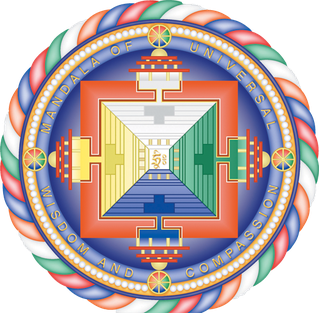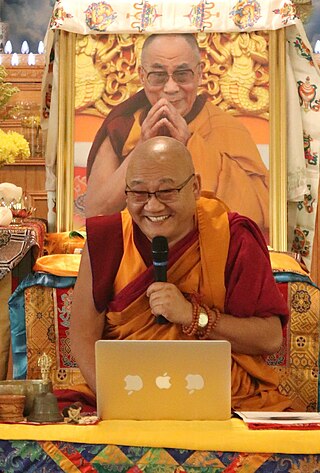
Tibetan Buddhism is the form of Buddhism practiced in the regions of Tibet and Mongolia. It is also practiced in regions surrounding the Himalayas such as Ladakh, Lahaul and Spiti, Sikkim, Arunachal Pradesh of India, Bhutan and parts of Nepal, in places of Central Asia, Xinjiang, Inner Mongolia and in some regions of Russia.
The Bodhisattvacaryāvatāra or Bodhicaryāvatāra translated into English as A Guide to the Bodhisattva's Way of Life, is a Mahāyāna Buddhist text written c. 700 AD in Sanskrit verse by Shantideva (Śāntideva), a Buddhist monk at Nālandā Monastic University in India which is also where it was composed.

The Gelug is the newest of the four major schools of Tibetan Buddhism. It was founded by Je Tsongkhapa (1357–1419), a Tibetan philosopher, tantric yogi and lama and further expanded and developed by his disciples.

The Kadam school of Tibetan Buddhism was an 11th century Buddhist tradition founded by the great Bengali master Atiśa (982-1054) and his students like Dromtön (1005–1064), a Tibetan Buddhist lay master. The Kadampa stressed compassion, pure discipline and study.

Geshe Kelsang Gyatso was a Buddhist monk, meditation teacher, scholar, and author. He was the founder and spiritual director of the New Kadampa Tradition-International Kadampa Buddhist Union (NKT-IKBU), a registered non-profit, modern Buddhist organization that came out of the Gelugpa school/lineage. 1,300 centres around the world, including temples, city temples and retreat centres offer an accessible approach to ancient wisdom.
Lamrim is a Tibetan Buddhist textual form for presenting the stages in the complete path to enlightenment as taught by Buddha. In Tibetan Buddhist history there have been many different versions of lamrim, presented by different teachers of the Nyingma, Kagyu and Gelug schools. However, all versions of the lamrim are elaborations of Atiśa's 11th-century root text A Lamp for the Path to Enlightenment (Bodhipathapradīpa).

Tsongkhapa was an influential Tibetan Buddhist monk, philosopher and tantric yogi, whose activities led to the formation of the Gelug school of Tibetan Buddhism. He is also known by his ordained name Losang Drakpa or simply as "Je Rinpoche". He is also known by Chinese as Zongkapa Lobsang Zhaba or just Zōngkàbā (宗喀巴).

The New Kadampa Tradition – International Kadampa Buddhist Union (NKT—IKBU) is a global Buddhist new religious movement founded by Kelsang Gyatso in England in 1991. In 2003 the words "International Kadampa Buddhist Union" (IKBU) were added to the original name "New Kadampa Tradition". The NKT-IKBU is an international organisation registered in England as a charitable, or non-profit, company. It currently lists more than 200 centres and around 900 branch classes/study groups in 40 countries. The BBC describe the New Kadampa Tradition as "one of the major Buddhist schools in the UK, founded by the Tibetan-born Geshe Kelsang Gyatso."
Mindstream (citta-santāna) in Buddhist philosophy is the moment-to-moment continuum of sense impressions and mental phenomena, which is also described as continuing from one life to another.

The Foundation for the Preservation of the Mahayana Tradition (FPMT) was founded in 1975 by Lamas Thubten Yeshe and Thubten Zopa Rinpoche, who began teaching Mahayana Buddhism to Western students in Nepal. The FPMT has grown to encompass over 160 dharma centers, projects, and services in 37 countries. Since the death of Lama Yeshe in 1984, the FPMT's spiritual director has been Lama Zopa Rinpoche.
Geshe or geshema is a Tibetan Buddhist academic degree for monks and nuns. The degree is emphasized primarily by the Gelug lineage, but is also awarded in the Sakya and Bön traditions. The equivalent geshema degree is awarded to women.
Lojong is a contemplative practice in the Tibetan Buddhist tradition which makes use of various lists of aphorisms or slogans which are used for contemplative practice. The practice involves refining and purifying one's motivations and attitudes. There are various sets of lojong aphorisms; the most widespread text in the Sarma traditions is that of Chekawa Yeshe Dorje. There is also another set of eight lojong slogans by Langri Tangpa. In the Nyingma tradition, there is a list of seven lojong slogans which are part of the Dzogchen Nyingthig lineage.
Brian A. Cutillo (1945–2006) was a scholar and translator in the field of Tibetan Buddhism. He was also an accomplished neuro-cognitive scientist, musician, anthropologist and textile weaver.

Serme Khen Rinpoche Geshe Tashi Tsering BEM is abbot of Sera Mey Monastic University in India. From 1994 to 2018, he was the resident Tibetan Buddhist teacher at Jamyang Buddhist Centre, London.

Thupten Jinpa Langri is a Tibetan Buddhist scholar, former monk and an academic of religious studies and both Eastern and Western philosophy. He has been the principal English translator to the Dalai Lama since 1985. He has translated and edited more than ten books by the Dalai Lama including The World of Tibetan Buddhism, A Good Heart: A Buddhist Perspective on the Teachings of Jesus, and the New York Times bestseller Ethics for the New Millennium.

The Tibet Institute Rikon is a Tibetan monastery located in Zell-Rikon im Tösstal in the Töss Valley in Switzerland. It was established as a non-profit foundation because Swiss laws resulting from the 19th century secularization movement did not allow for the establishment of new monasteries until 1973

Kyabje Yongzin Ling Rinpoche is a Tibetan tulku. The best-known incarnation is the sixth incarnation, Thupten Lungtok Namgyal Thinley, a Tibetan buddhist scholar and teacher.
Geshe Lharampa Jinpa Sonam is a Tibetan Buddhist philosopher and Spiritual Director for the Indiana Buddhist Center. Sonam was born on May 25, 1955, in Zanskar valley, Ladakh, in the Republic of India. In 1967, he became a monk at the Stagrimo Gompa, a Drukpa Kagyu monastery in Ladakh near Padum. He studied at this monastery for six years before joining the Drepung Gomang Monastery, a Gelugpa monastery in Mundgod, Karnataka India as a novice monk.

Tethong Tenzin Namgyal is a Tibetan politician and a former Prime Minister of Central Tibetan Administration.

Geshe Thupten Phelgye is a Tibetan Buddhist lama who is known for promoting vegetarianism and humane treatment of animals, and for his work as a peace activist. Geshe Thupten Phelgye represents the Gelug tradition in the Tibetan Parliament in Exile.













